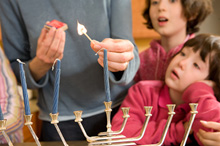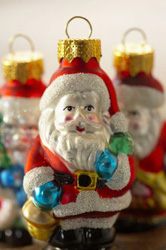What Are the Other Religions’ Holidays During the Holiday Season About? A Very Short Overview
by www.SixWise.com
by www.Sixwise.com
The winter season is a time of festive holiday celebrations. Depending on your beliefs, you may be more familiar with one holiday than another. Here is a list of winter celebrations to help boost your holiday IQ:
|

Festivities of Hanukkah include lighting candles in a menorah -- an 8-branched candelabrum (occasionally there is a ninth branch to hold the candle that lights the other candles) to symbolize the eight days of oil.
|
Hanukkah
Monday, December 22 of this year marks the beginning of the Jewish holiday Hannukah, or Chanukka, or even Chanuka. The reason for the different spellings is because the English alphabet does not contain the same letters as the Hebrew alphabet. The date changes from year to year according to when the date falls on the Hebrew calendar.
Hanukkah is an eight-day celebration commemorating the rededication of the Temple after the Jewish victory over the Syrians. The holiday lasts for eight days because the oil used by the Jewish people in their battle was only supposed to last for one day, and instead lasted for eight.
Festivities include lighting candles in a menorah -- an 8-branched candelabrum (occasionally there is a ninth branch to hold the candle that lights the other candles) to symbolize the eight days of oil. Latkes (potato pancakes) are eaten, as well as other foods cooked in oil, dreidels (four-sided top used in a gambling game) are spun, and money or gifts are given to friends and family.
Hajj
This Islamic holiday occurs during the month of Dhul Hijjah in the lunar Islamic calendar. This year it will be held from December 6 - December 9. This annual pilgrimage to Mount Arafat in Mecca, required once in a Muslim’s lifetime, is filled with ceremonies symbolizing the core concepts of the Islamic Faith. These ceremonies represent submission, brotherhood, unity, and also serve as a commemoration of the Prophet Abraham’s sacrifice and obedience to God.
Eid-ul-Adha
This Islamic holiday occurs on the tenth day of Dhul Hijjah -- the third day of Hajj. Celebrations last 2-3 days, depending on the country. Eid-ul-Adha would thus occur the day after Muslims descend from Mount Arafat after their pilgrimage. This holiday commemorates Abraham’s willingness to sacrifice his son to God. Abraham’s son was ultimately replaced by a lamb. Consequently, Muslims sacrifice their best domestic animals in celebration, sharing the meat with family and friends, giving a large portion of the meat to the poor and needy. It is tradition that Muslims will dress in their finest clothing to attend a mosque to perform the Eid prayer.
|

The modern-day notion of Santa Claus may have stemmed from the 4th century Bishop Nicholas of Smyrna (Turkey); he was a wealthy man who loved children and gave generously to them.
|
Christmas
Christmas is the Christian celebration of the birth of Jesus Christ, Son of God, held on December 25. It is used as a time to renew one’s faith, contemplate the past, and give generously. This holiday has been adopted by many Christians and non-Christians alike who celebrate with friends and family for big feasts and gift-giving.
Santa Claus has become synonymous with Christmas -- jolly, old St. Nick, who flies around the world on Christmas eve in a sleigh led by reindeer, giving presents to all of the world’s children who made it on the “nice” list. The Santa Claus of today has been molded over the years from many different myths and legends. At the root of these legends is the 4th century Bishop Nicholas of Smyrna (Turkey). He was a wealthy man who loved children and gave generously to them, often throwing gifts through poor children’s windows.
Kwanzaa
Kwanzaa is a week-long celebration, from December 26 - January 1, honoring African heritage throughout the world. The origin of the holiday stems from the first harvest celebrations of Africa. Kwanzaa is taken from a Swahili phrase meaning “first fruits.” The first fruits celebrations date back to Ancient Egyptian and Nubian times.
The festivities include lighting a kinara, or candle holder, pouring libations, and enjoying a large feast and gift-giving.
Bodhi Day
Buddhists across the world celebrate Bodhi Day on December 8, or the Sunday preceding. Prince Siddhartha Gautauma went on a journey, leaving his family and earthly possessions to find the meaning of life. After six years of education and guidance under various spiritual teachers, Siddhartha still had not realized the meaning of life. He sat under a Pipul tree and refused to get up until he had discovered that which he sought. On the eighth day, Siddhartha rose and presented the Four Noble Truths, which define the root of suffering and how to free oneself from it. After his realization of the meaning of life, Siddhartha was known as Buddha -- the Enlightened One. This eighth day is a day of celebration for Buddhists.
Many Buddhists celebrate through reflection of what Buddha’s revelation means in this day and age, some choose additional meditation, chanting of Buddhist sutras (texts), and engaging in kind acts toward others.
Recommended Reading
March 19! Happy St. Joseph's Day! (But What Exactly IS St. Joseph's Day?)
15 Tips to Avoid Overeating This Holiday Season
Sources
Buddhist Temple of Chicago. Bodhi Day. December 2008
Holiday.net. The History of Christmas. December 2008
HowStuffWorks.com. How Christmas Works. December 2008
Islamic Network Groups. Important Islamic Dates. December 2008
Jewish Communities Federation. JHolidays. December 2008
Official Kwanzaa Website. Kwanzaa: Roots and Branches. December 2008
The-north-pole.com. History of Santa Claus. December 2008